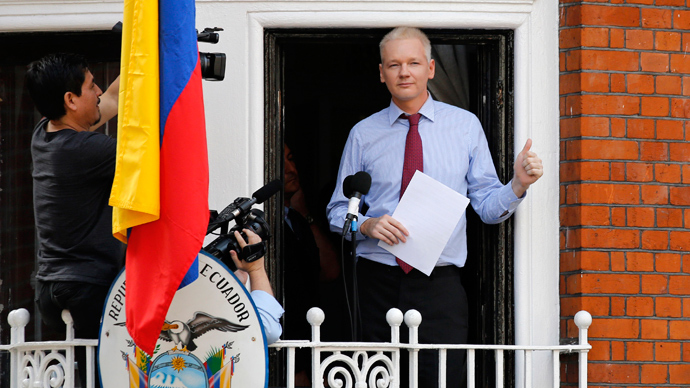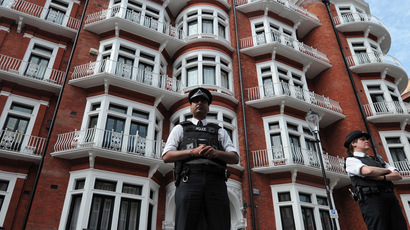London's costs spiral upwards as Assange stakeout sees no end

London officials are facing scrutiny over the spiraling cost of maintaining a 24-hour police watch outside of the Ecuadorian embassy, where WikiLeaks founder Julian Assange has now resided for a year.
According to a letter sent in response to London assembly member
Jenny Jones, London’s Metropolitan police commissioner Sir
Bernard Hogan-Howe has said that the total cost so far of
constantly policing the embassy adds up to £3.8 million, £0.7
million of which is comprised of additional costs for increased
overtime wages to officers.
Assange, who entered the embassy in June of last year, is
currently in a sort of legal limbo as the online activist's host
country of Ecuador has granted him political asylum, but would
face extradition to Sweden for questioning in connection to
allegations of sexual assault, and could well be turned over to
US authorities to face charges stemming from the publication of
classified documents provided by Bradley Manning.
Though Assange maintains that the sexual assault accusations have
been fabricated as part of a political smear campaign against
him, the UK has promised to arrest him should he set foot outside
of diplomatically protected Ecuadorian territory.
Jenny Jones, a member of the Green party, has said that the
situation is unsustainable for the City of London.
"It's ridiculous that for over
a year now the Metropolitan police service have been stationed
outside the Ecuadorian embassy waiting for Julian Assange to
attempt an escape. At a time when the Met is making cuts how can
this be a priority for the police? This situation cannot be
allowed to continue indefinitely. The mayor really should be
trying to find a solution to this stalemate because in the
meantime the Met is spending time and resources on an expensive
stakeout," Jones tells The Guardian.

UK Foreign Secretary William Hague met his his Ecuadorian
counterpart Ricardo Patiño in June to discuss Assange, though
they evidently failed to reach any compromise.
The British Foreign Office said that “no substantive progress” had been
made following that meeting, while Patiño remarked that the
situation was “totally
unjust,” and that Ecuador was prepared to wait it out,
with Assange having told him he was “fit enough” to spend another
five years within the embassy.
"Our government will not hand
Mr. Assange over to the UK government nor to anyone else and we
shall continue to stress that Mr. Assange has the right to
benefit from asylum," said Patiño.
"We feel he should be handed
over into safe conduct so that he can leave the UK for
elsewhere," he added.
At the same time, despite the round-the-clock picket by London
police, Patiño stated that his country had no intention of trying
to whisk away the WikiLeaks founder through subterfuge.
“We're not going to smuggle Mr.
Assange out in the boot of a car or through an underground tunnel
or something," Patiño said.
Assange has also stated that he would likely not leave the west
London embassy even if Sweden were to drop its extradition orders
against him, convinced that the US would instead transport him
stateside to face espionage charges.














